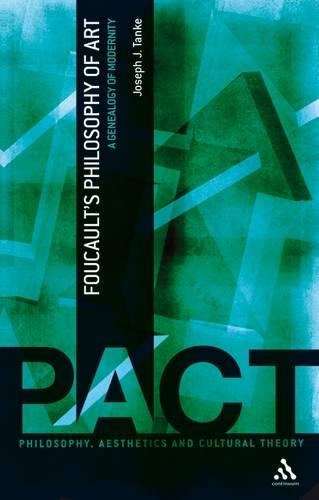
Foucault's Philosophy of Art: A Genealogy of Modernity
(Paperback)
Available Formats
Publishing Details
Foucault's Philosophy of Art: A Genealogy of Modernity
By (Author) Professor Joseph J. Tanke
Bloomsbury Publishing PLC
Continuum International Publishing Group Ltd.
30th June 2009
United Kingdom
Classifications
Professional and Scholarly
Non Fiction
Philosophy: aesthetics
701.17092
Physical Properties
Paperback
240
Width 138mm, Height 216mm
Description
Foucault's Philosophy of Art: A Genealogy of Modernity tells the story of how art shed the tasks with which it had traditionally been charged in order to become modern. Joseph J. Tanke offers the first complete examination of Michel Foucault's reflections on visual art, tracing his thought as it engages with the work of visual artists from the seventeenth century to the contemporary period. The book offers a concise and accessible introduction to Foucault's frequently anthologized, but rarely understood, analyses of Diego Velzquez's Las Meninas and Ren Magritte's Ceci n'est pas une pipe. On the basis of unpublished lecture courses and several un-translated analyses of visual art, Tanke reveals the uniquely genealogical character of Foucault's writings on visual culture, allowing for new readings of his major texts in the context of contemporary Continental philosophy, aesthetic and cultural theory. Ultimately Tanke demonstrates how Foucault provides philosophy and contemporary criticism with the means for determining a conception of modern art.
Reviews
Ideal for both undergraduates seeking a reliable overview and for scholars interested in the positioning of artworks in modernity, this book's strengths are its clarity of composition, its author's critical detachment, and the fascinating use to which he puts Foucault's quite recently published lectures about artworks and artists. -- French Studies
Author Bio
Joseph J. Tanke is based at the University of Hawaii. He has published and lectured extensively on issues in Continental philosophy, with a special emphasis on aesthetics and politics, as well as the works of Michel Foucault, Gilles Deleuze, and Jacques Rancire. Professor Tanke was recently named to the editorial board of Philosophy and Social Criticism, and his essays are currently being translated into two other languages. In addition to having studied philosophy in both the United States and Europe, Joseph holds a degree in art history and has worked for several art institutions.
